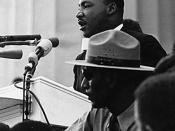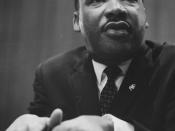Despite the millennia that separate the ancient Hebrew prophets, Amos and Hosea, from the 20th century American theologians, Reinhold Neihbuhr and James Cone, their concerns for social justice have some similarities in today's world. These similarities would probably dismay the early prophets if they had the power to be aware of them, and they might ponder that the great time gap between themselves did not altogether alleviate the lack of social justices that pervades many areas of the world to this day, and in America itself. Amos, for example, would no doubt be supportive of Gone in his demand for social justice for the black population. And he probably would be pleased to know that Niebuhr was described as "an American Amos"� (Niebuhr200). He would agree that Niebuhr writings show that religion has been and can be a "catalyst for unrest and change"�. Hosea, on the other hand, would surely applaud Cone for his bluntness in denouncing racism whereas his own writings or preaching often had to be clothed in metaphor.
The most flagrant example of social injustice that the Hebrew prophets would observe in today's America is racism, particularly in relation to black people. Despite civil rights legislation, there is no denying that many black Americans do not feel totally accepted as equal by most of the white population. Cone, who was prominent during the Black Power movement of the late 60's and early 70's, had the "prophetic anger"� of the ancient Hebrews. Black Power, he believed, was "essentially a message of liberation"� (232). It was an expression of the gospel because it was meant to "liberate men from oppressive conditions"�(232).
The principal purpose of envisioning for future is to disclose the intolerable injustices of the present. The hope shared by Black Power and biblical theology is thus...


